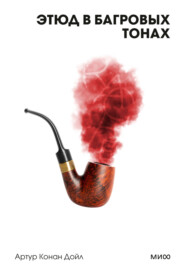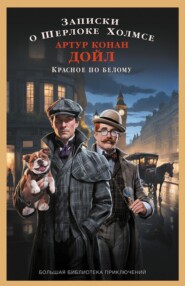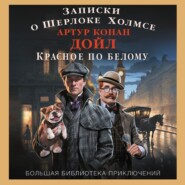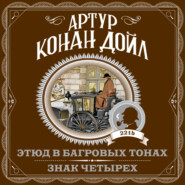По всем вопросам обращайтесь на: info@litportal.ru
(©) 2003-2025.
✖
Все приключения Шерлока Холмса. Сборник. Уровень 2
Настройки чтения
Размер шрифта
Высота строк
Поля
‘No doubt you are the gentleman whom he was expecting,’ they said.
‘Where is he now?’ I asked.
‘He is upstairs in bed.’
‘I will go up and see him at once,’ I said.
His room was on the second floor. From under the door there curled a little red ribbon of blood, which formed a little pool. The door was locked on the inside[45 - the door was locked on the inside – дверь была заперта изнутри], but we put our shoulders to it, and entered. The window of the room was open, and beside the window lay the body of a man in his nightdress. He was dead, his limbs were rigid and cold. When we turned him over, the men from the hotel recognized him at once. It was the gentleman who engaged the room under the name of Joseph Stangerson. The cause of death was a deep stab in the left side. And now comes the strangest part of the affair. What was above the murdered man?”
“The word RACHE, written in letters of blood,” said Holmes.
“That was it!” said Lestrade.
“A milk boy saw the murder,” continued Lestrade. “He was going to the dairy. He walked down the lane which leads from the mews at the back of the hotel. He noticed that a ladder was raised against one of the windows of the second floor, which was wide open. And he saw a man who was descending the ladder. The boy thought it was a carpenter. The man was tall, had a reddish face, and was dressed in a long, brownish coat. He stayed in the room some little time after the murder, for we found blood-stained water in the basin. We also found marks on the sheets where he wiped his knife.”
I glanced at Holmes.
“Did you find anything in the room which gave a clue to the murderer?” he asked.
“Nothing. Stangerson had Drebber’s purse in his pocket, but it was usual, as he paid. There was eighty pounds in it. So robbery is not the motives of these extraordinary crimes. There were no papers in the murdered man’s pocket, except a single telegram, dated from Cleveland about a month ago: ‘J. H. is in Europe’.”
“And there was nothing else?” Holmes asked.
“Nothing of any importance. The novel, which the man read, was lying upon the bed, and his pipe was on a chair beside him. There was a glass of water on the table, and on the window-sill a small chip ointment box containing a couple of pills.”
Sherlock Holmes sprang from his chair with an exclamation of delight.
“The last link!” he cried, exultantly.
The two detectives stared at him in amazement.
“Now I know everything,” my companion said, confidently, “What about those pills?”
“I have them,” said Lestrade. He showed us a small white box; “I took them and the purse and the telegram.”
“Give them here,” said Holmes. “Now, Doctor,” he turned to me, “are those ordinary pills?”
They certainly were not. They were of a pearly grey colour, small, round, and almost transparent.
“I think that they are soluble in water,” I remarked.
“Precisely so,” answered Holmes. “Now please go down and fetch that poor little terrier which the landlady wanted you to put out of its pain[46 - wanted you to put out of its pain – просила вас усыпить его, чтобы он больше не мучился]yesterday.”
I went downstairs and carried the dog upstairs in my arms. It was not far from its end. I placed the terrier upon a cushion on the rug.
“I will now cut one of these pills in two,” said Holmes. “One half we return into the box. The other half I will place in this glass, in which is a teaspoonful of water. You perceive that our friend, the Doctor, is right, and that it readily dissolves.”
“This may be very interesting,” said Lestrade, “I cannot see, however, how it is connected with the death of Mr. Joseph Stangerson.”
“Patience, my friend, patience! I shall now add a little milk and give this mixture to the dog.”
As he spoke he turned the contents of the glass into a saucer and placed it in front of the terrier, who speedily drank it. Nothing happened, however. The dog continued to lie and breathe.
An expression of the utmost chagrin and disappointment appeared upon Holmes’ face. He gnawed his lip, and showed symptoms of acute impatience. Two detectives smiled derisively.
“It can’t be a coincidence,” Holmes cried; “it is impossible. These pills which I suspected in the case of Drebber! They are here. And yet they are inert. What can it mean? It is impossible! Ah, I have it! I have it!”
With a perfect shriek of delight he rushed to the box, cut the other pill in two, dissolved it, added milk, and gave it to the terrier. The unfortunate dog drank the mixture again, gave a convulsive shiver, and lay lifeless.
Sherlock Holmes wiped the perspiration from his forehead.
“Of the two pills in that box one was of the most deadly poison,” he said; “and the other was entirely harmless.”
“Look here, Mr. Sherlock Holmes,” said Mr. Gregson, “we are all ready to acknowledge that you are a smart man, and that you have your own methods of working. It seems I was wrong. It appears that Lestrade was wrong too. But we have a right to ask you straight how much you do know of the business. Can you name the man who did it?”
“Yes, sir,” remarked Lestrade. “We both tried, and we both failed. But what is your opinion?”
“If you know the assassin, let’s arrest him,” I observed. “He may kill again.”
Holmes showed signs of irresolution.
“There will be no more murders,” he said at last. “You ask me if I know the name of the assassin. I do. But the question is to catch him. We deal with a shrewd and desperate man. And he has another one who is as clever as himself. If he has the slightest suspicion, he will change his name and vanish in an instant among the four million inhabitants of this great city. Gentlemen, I promise that I will communicate with you when I’m ready to catch him.”
Gregson and Lestrade were not satisfied. There was a tap at the door, and young Wiggins came in.
“Please, sir,” he said, “I have the cab downstairs.”
“Good boy,” said Holmes, blandly. He took a pair of steel handcuffs from a drawer. “See how they fasten in an instant.”
“The old handcuffs are good enough,” remarked Lestrade.
“Very good, very good,” said Holmes. “The cabman will help me with my boxes. Ask him to come, Wiggins.”
I was surprised. Holmes was going to travel somewhere, and he did not say anything to me about it. There was a small portmanteau in the room. The cabman entered the room.
“Please help me with this buckle, cabman,” Holmes said.
The fellow came forward and put down his hands to assist. At that instant there was a sharp click, the jangling of metal, and Sherlock Holmes sprang to his feet again.
“Gentlemen,” he cried, “let me introduce you to Mr. Jefferson Hope, the murderer of Enoch Drebber and of Joseph Stangerson.”
For a second or two we were a group of statues. Then, with a roar of fury, the cabman hurled himself through the window. Gregson, Lestrade, and Holmes sprang upon him like staghounds. They dragged him back into the room. The man was very powerful and fierce. Finally Lestrade got his hand inside his neckcloth and half-strangled him. We pinioned his feet as well as his hands.
“We have his cab,” said Sherlock Holmes. “It will take him to Scotland Yard. And now, gentlemen,” he continued, with a pleasant smile, “we see the end of our little mystery. Welcome to put any questions, and I will answer them.”
Part II
Chapter I
‘Where is he now?’ I asked.
‘He is upstairs in bed.’
‘I will go up and see him at once,’ I said.
His room was on the second floor. From under the door there curled a little red ribbon of blood, which formed a little pool. The door was locked on the inside[45 - the door was locked on the inside – дверь была заперта изнутри], but we put our shoulders to it, and entered. The window of the room was open, and beside the window lay the body of a man in his nightdress. He was dead, his limbs were rigid and cold. When we turned him over, the men from the hotel recognized him at once. It was the gentleman who engaged the room under the name of Joseph Stangerson. The cause of death was a deep stab in the left side. And now comes the strangest part of the affair. What was above the murdered man?”
“The word RACHE, written in letters of blood,” said Holmes.
“That was it!” said Lestrade.
“A milk boy saw the murder,” continued Lestrade. “He was going to the dairy. He walked down the lane which leads from the mews at the back of the hotel. He noticed that a ladder was raised against one of the windows of the second floor, which was wide open. And he saw a man who was descending the ladder. The boy thought it was a carpenter. The man was tall, had a reddish face, and was dressed in a long, brownish coat. He stayed in the room some little time after the murder, for we found blood-stained water in the basin. We also found marks on the sheets where he wiped his knife.”
I glanced at Holmes.
“Did you find anything in the room which gave a clue to the murderer?” he asked.
“Nothing. Stangerson had Drebber’s purse in his pocket, but it was usual, as he paid. There was eighty pounds in it. So robbery is not the motives of these extraordinary crimes. There were no papers in the murdered man’s pocket, except a single telegram, dated from Cleveland about a month ago: ‘J. H. is in Europe’.”
“And there was nothing else?” Holmes asked.
“Nothing of any importance. The novel, which the man read, was lying upon the bed, and his pipe was on a chair beside him. There was a glass of water on the table, and on the window-sill a small chip ointment box containing a couple of pills.”
Sherlock Holmes sprang from his chair with an exclamation of delight.
“The last link!” he cried, exultantly.
The two detectives stared at him in amazement.
“Now I know everything,” my companion said, confidently, “What about those pills?”
“I have them,” said Lestrade. He showed us a small white box; “I took them and the purse and the telegram.”
“Give them here,” said Holmes. “Now, Doctor,” he turned to me, “are those ordinary pills?”
They certainly were not. They were of a pearly grey colour, small, round, and almost transparent.
“I think that they are soluble in water,” I remarked.
“Precisely so,” answered Holmes. “Now please go down and fetch that poor little terrier which the landlady wanted you to put out of its pain[46 - wanted you to put out of its pain – просила вас усыпить его, чтобы он больше не мучился]yesterday.”
I went downstairs and carried the dog upstairs in my arms. It was not far from its end. I placed the terrier upon a cushion on the rug.
“I will now cut one of these pills in two,” said Holmes. “One half we return into the box. The other half I will place in this glass, in which is a teaspoonful of water. You perceive that our friend, the Doctor, is right, and that it readily dissolves.”
“This may be very interesting,” said Lestrade, “I cannot see, however, how it is connected with the death of Mr. Joseph Stangerson.”
“Patience, my friend, patience! I shall now add a little milk and give this mixture to the dog.”
As he spoke he turned the contents of the glass into a saucer and placed it in front of the terrier, who speedily drank it. Nothing happened, however. The dog continued to lie and breathe.
An expression of the utmost chagrin and disappointment appeared upon Holmes’ face. He gnawed his lip, and showed symptoms of acute impatience. Two detectives smiled derisively.
“It can’t be a coincidence,” Holmes cried; “it is impossible. These pills which I suspected in the case of Drebber! They are here. And yet they are inert. What can it mean? It is impossible! Ah, I have it! I have it!”
With a perfect shriek of delight he rushed to the box, cut the other pill in two, dissolved it, added milk, and gave it to the terrier. The unfortunate dog drank the mixture again, gave a convulsive shiver, and lay lifeless.
Sherlock Holmes wiped the perspiration from his forehead.
“Of the two pills in that box one was of the most deadly poison,” he said; “and the other was entirely harmless.”
“Look here, Mr. Sherlock Holmes,” said Mr. Gregson, “we are all ready to acknowledge that you are a smart man, and that you have your own methods of working. It seems I was wrong. It appears that Lestrade was wrong too. But we have a right to ask you straight how much you do know of the business. Can you name the man who did it?”
“Yes, sir,” remarked Lestrade. “We both tried, and we both failed. But what is your opinion?”
“If you know the assassin, let’s arrest him,” I observed. “He may kill again.”
Holmes showed signs of irresolution.
“There will be no more murders,” he said at last. “You ask me if I know the name of the assassin. I do. But the question is to catch him. We deal with a shrewd and desperate man. And he has another one who is as clever as himself. If he has the slightest suspicion, he will change his name and vanish in an instant among the four million inhabitants of this great city. Gentlemen, I promise that I will communicate with you when I’m ready to catch him.”
Gregson and Lestrade were not satisfied. There was a tap at the door, and young Wiggins came in.
“Please, sir,” he said, “I have the cab downstairs.”
“Good boy,” said Holmes, blandly. He took a pair of steel handcuffs from a drawer. “See how they fasten in an instant.”
“The old handcuffs are good enough,” remarked Lestrade.
“Very good, very good,” said Holmes. “The cabman will help me with my boxes. Ask him to come, Wiggins.”
I was surprised. Holmes was going to travel somewhere, and he did not say anything to me about it. There was a small portmanteau in the room. The cabman entered the room.
“Please help me with this buckle, cabman,” Holmes said.
The fellow came forward and put down his hands to assist. At that instant there was a sharp click, the jangling of metal, and Sherlock Holmes sprang to his feet again.
“Gentlemen,” he cried, “let me introduce you to Mr. Jefferson Hope, the murderer of Enoch Drebber and of Joseph Stangerson.”
For a second or two we were a group of statues. Then, with a roar of fury, the cabman hurled himself through the window. Gregson, Lestrade, and Holmes sprang upon him like staghounds. They dragged him back into the room. The man was very powerful and fierce. Finally Lestrade got his hand inside his neckcloth and half-strangled him. We pinioned his feet as well as his hands.
“We have his cab,” said Sherlock Holmes. “It will take him to Scotland Yard. And now, gentlemen,” he continued, with a pleasant smile, “we see the end of our little mystery. Welcome to put any questions, and I will answer them.”
Part II
Chapter I

















